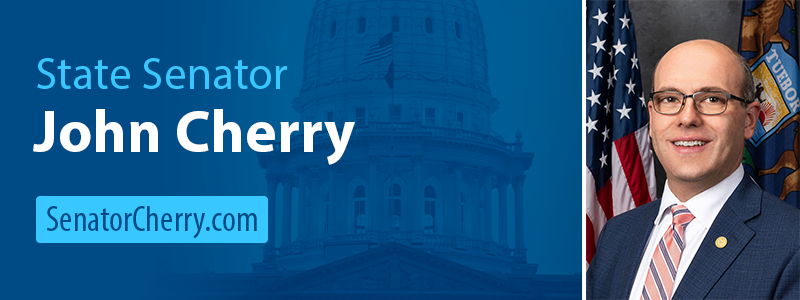Dear neighbors,
I hope you and your families had a fantastic spring break and have been enjoying the warm spring weather! For the past two weeks, the legislature has been on break, allowing myself and my colleagues to return their attention to their districts and work on planning for the remainder of the legislative term. So, while I won’t have any legislative updates for this newsletter, below I have some helpful resources for issues that our residents have brought to my attention recently and notes for the month of April.Native Plant Month & Planting Season
As we roll into spring and notice beautiful colors returning to our surroundings, we also celebrate April as Native Plant Month. Michigan is home to more than 1,800 native plant species which include large shade trees, shrubs, vines, wildflowers, and everyone’s favorite spring flower, the orange traffic cone. To protect our environment—including our native plants—record investments have been made in conservation and natural resources through the Building Michigan Together Plan and the MI Healthy Climate Plan. Let’s keep working together to preserve our green spaces.
Looking to start your garden this spring? Mott Community College Library has restarted their seed library and has a wide variety of offerings to get your garden growing. They also have plenty of informational materials and advice for experienced growers looking to expand their selections and for newcomers to the gardening world as well. You can find more information online or at (810) 762-0401April 2023 is Arab American Heritage and Chaldean-American Month
Coming from an Arab American family myself, I would be remiss not to mention that April is Arab American Heritage and Chaldean-American Month where we commemorate the valuable contributions that Middle Eastern Americans have made to virtually every aspect of American society in medicine, law, business, education, technology, government, military service, culture, and more. Middle Eastern Americans have also enriched our society by sharing in the entrepreneurial American spirit that makes our nation free and prosperous.
The Chaldean Assyrian Syriac community enriches Michigan’s cultural tapestry and prosperity through their success in the arts, business, law, politics, education, medicine, architecture, and engineering. Michigan is home to one of the largest Arab American communities in the U.S., as well as the largest concentration of Chaldean Assyrian Syriacs in the country.
I’m proud to have co-sponsored Senate Resolution 27, which recognizes April as Arab-American Heritage month, and I look forward to celebrating throughout the month.Helping Medicaid members keep their coverageTake action to avoid a gap in coverage
At the beginning of the COVID-19 pandemic, the federal government declared a Public Health Emergency (PHE), allowing Medicaid members to keep their health care coverage. Per recent federal legislation, eligibility renewals will start again in June. Monthly renewal notifications will be sent by mail beginning in May.
Following these steps will help determine if you still qualify:
- Make sure your contact information is up to date.
- Check mail or text messages for a letter.
- Complete your renewal form (if you get one).
If you’re a Medicaid member, learn more about how these changes may affect your health care coverage at Michigan.gov/2023benefitchanges.
For local health insurance assistance, I recommend reaching out to Genesee Health Plan (GHP). GHP is a local non-profit that helps advise and connect residents to health insurance and health care resources. Their navigators can help answer questions and work with you to ensure that your health coverage continues as we enter the redetermination period for Medicaid services and work through this change. You can reach them at (810) 232-7740 or online.Changing Health Insurance can impact Auto Insurance
Your auto insurance may not be the first thing that comes to mind if you lose or change your health insurance, but there is an important connection that every Michigander should know about.
Under Michigan’s auto insurance law, drivers can choose from six different Personal Injury Protection (PIP) medical coverage levels when they buy or renew their auto insurance, which covers medical bills and other expenses if you are injured in an auto accident. For people who have Qualified Health Coverage (QHC), two options allow you to remove PIP medical coverage for yourself and/or eligible household members.
To count as QHC, your health insurance policy must not exclude or limit coverage for auto accident injuries and must have an individual deductible of $6,000 or less. Medicare Parts A and B or Medicare Advantage also count as QHC, but please note VA Health Benefits do not count as QHC.
If someone in your household does not have PIP medical coverage and has a change in their health insurance, you must ACT:
- A – Ask your auto insurance company or agent about your PIP medical coverage choice and find out if you need QHC to maintain your current selection.
- C – Contact your health insurer to determine if your new policy counts as QHC and to get an updated QHC letter.
- T –Tell your auto insurance company immediately if you lose your QHC. You have 30 days to obtain replacement health insurance or make a different PIP medical selection, or you risk not having medical coverage for yourself and your family in the event of a crash.
If you are interested in learning more or have questions, visit Michigan.gov/AutoInsurance or call the Michigan Department of Insurance and Financial Services Monday through Friday 8 a.m. to 5 p.m. at (833) ASK-DIFS (275-3437).
I hope this information is helpful. Thanks again for your time! Please don’t hesitate to reach out to me at 517-373-0142 or SenJCherry@senate.michigan.gov with questions or concerns.
Sincerely,
John CherryState SenatorDistrict 27

